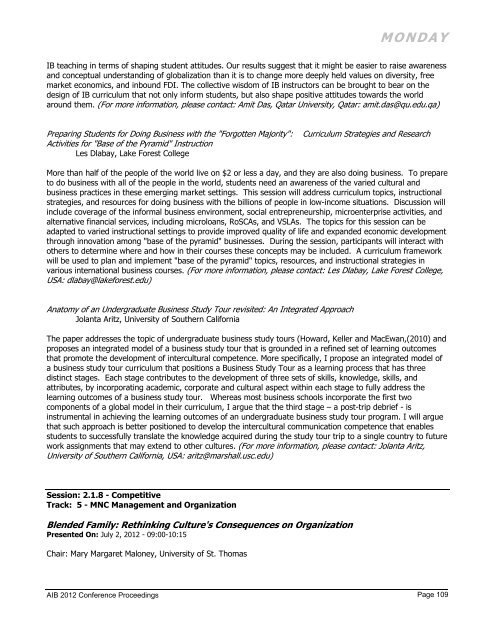AIB 2012 Conference Proceedings - Academy of International ...
AIB 2012 Conference Proceedings - Academy of International ...
AIB 2012 Conference Proceedings - Academy of International ...
Create successful ePaper yourself
Turn your PDF publications into a flip-book with our unique Google optimized e-Paper software.
MONDAY<br />
IB teaching in terms <strong>of</strong> shaping student attitudes. Our results suggest that it might be easier to raise awareness<br />
and conceptual understanding <strong>of</strong> globalization than it is to change more deeply held values on diversity, free<br />
market economics, and inbound FDI. The collective wisdom <strong>of</strong> IB instructors can be brought to bear on the<br />
design <strong>of</strong> IB curriculum that not only inform students, but also shape positive attitudes towards the world<br />
around them. (For more information, please contact: Amit Das, Qatar University, Qatar: amit.das@qu.edu.qa)<br />
Preparing Students for Doing Business with the "Forgotten Majority":<br />
Activities for "Base <strong>of</strong> the Pyramid" Instruction<br />
Les Dlabay, Lake Forest College<br />
Curriculum Strategies and Research<br />
More than half <strong>of</strong> the people <strong>of</strong> the world live on $2 or less a day, and they are also doing business. To prepare<br />
to do business with all <strong>of</strong> the people in the world, students need an awareness <strong>of</strong> the varied cultural and<br />
business practices in these emerging market settings. This session will address curriculum topics, instructional<br />
strategies, and resources for doing business with the billions <strong>of</strong> people in low-income situations. Discussion will<br />
include coverage <strong>of</strong> the informal business environment, social entrepreneurship, microenterprise activities, and<br />
alternative financial services, including microloans, RoSCAs, and VSLAs. The topics for this session can be<br />
adapted to varied instructional settings to provide improved quality <strong>of</strong> life and expanded economic development<br />
through innovation among "base <strong>of</strong> the pyramid" businesses. During the session, participants will interact with<br />
others to determine where and how in their courses these concepts may be included. A curriculum framework<br />
will be used to plan and implement "base <strong>of</strong> the pyramid" topics, resources, and instructional strategies in<br />
various international business courses. (For more information, please contact: Les Dlabay, Lake Forest College,<br />
USA: dlabay@lakeforest.edu)<br />
Anatomy <strong>of</strong> an Undergraduate Business Study Tour revisited: An Integrated Approach<br />
Jolanta Aritz, University <strong>of</strong> Southern California<br />
The paper addresses the topic <strong>of</strong> undergraduate business study tours (Howard, Keller and MacEwan,(2010) and<br />
proposes an integrated model <strong>of</strong> a business study tour that is grounded in a refined set <strong>of</strong> learning outcomes<br />
that promote the development <strong>of</strong> intercultural competence. More specifically, I propose an integrated model <strong>of</strong><br />
a business study tour curriculum that positions a Business Study Tour as a learning process that has three<br />
distinct stages. Each stage contributes to the development <strong>of</strong> three sets <strong>of</strong> skills, knowledge, skills, and<br />
attributes, by incorporating academic, corporate and cultural aspect within each stage to fully address the<br />
learning outcomes <strong>of</strong> a business study tour. Whereas most business schools incorporate the first two<br />
components <strong>of</strong> a global model in their curriculum, I argue that the third stage – a post-trip debrief - is<br />
instrumental in achieving the learning outcomes <strong>of</strong> an undergraduate business study tour program. I will argue<br />
that such approach is better positioned to develop the intercultural communication competence that enables<br />
students to successfully translate the knowledge acquired during the study tour trip to a single country to future<br />
work assignments that may extend to other cultures. (For more information, please contact: Jolanta Aritz,<br />
University <strong>of</strong> Southern California, USA: aritz@marshall.usc.edu)<br />
Session: 2.1.8 - Competitive<br />
Track: 5 - MNC Management and Organization<br />
Blended Family: Rethinking Culture's Consequences on Organization<br />
Presented On: July 2, <strong>2012</strong> - 09:00-10:15<br />
Chair: Mary Margaret Maloney, University <strong>of</strong> St. Thomas<br />
<strong>AIB</strong> <strong>2012</strong> <strong>Conference</strong> <strong>Proceedings</strong><br />
Page 109

















